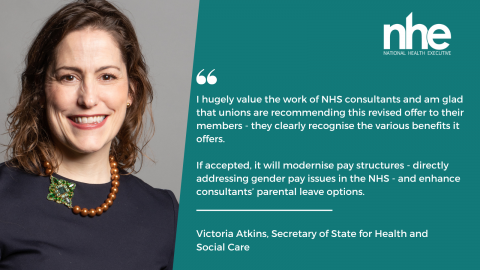The British Medical Association (BMA) and Hospital Consultants and Specialists Association (HCSA) have agreed a new pay offer with the government.
The new offer contains many of the features of the previous agreement that was narrowly rejected at the BMA ballot (51%-49%), including the 3.45% fresh government investment into pay, which will be further bolstered by 1.5% as the funding for local clinical excellence awards gets moved into basic pay.
Faster progression through fewer pay points and the introduction of shared parental leave also remain.
New elements of the offer include a 2.85% uplift for those who have been consultants between four and seven years. This is in addition to the 6% that was awarded last year.
The previous offer also prompted concerns regarding the proposals for supporting professional activities time, which has now been removed entirely.
The Review Body on Doctors’ and Dentists’ Remuneration (DDRB) still sees major reform, with the trade unions having greater say on the appointment of DDRB members.
The DDRB’s terms of reference would change so pay recommendations would have to reflect wider pressures and factors, ultimately benchmarking against international comparators.

The BMA’s consultants committee chair, Vishal Sharma, described the offer as a “positive step forward”.
He said: “We believe that the reforms that come with this offer will begin to make significant progress on our original objectives, achieving an above-inflation pay uplift and restitution of the DDRB to its founding principles.”
No strike action will be taken while the BMA and HCSA consults on the new offer, with a referendum set to open 14 March and close 4 April.
President of the HCSA, Dr Naru Narayanan, added: “HCSA maintains its view that long-term pay erosion must be addressed for all grades of doctor, something this package does not resolve.
“However, we acknowledge the government’s movement on its original position, including on DDRB reform which is crucial to be able to redress real-terms wage decline in future.”
NHS Providers’ deputy chief executive, Saffron Cordery, said trust leaders will now be optimistic about the possibility of “light at the end of the tunnel.”
“We also hope that junior doctors can find a similar path to the consultants and agree a deal with the government that can be put to their members,” added the NHS Confederation’s chief executive, Matthew Taylor.
“Ending strike action in the NHS is vital…”
NHS England (NHSE) data following the latest junior doctors strike indicates that over 91,000 inpatient and outpatient appointments were rescheduled, while nearly 24,000 staff were absent due to industrial action.
NHSE’s national medical director, Professor Sir Stephen Powis, said that, while this figure demonstrates the impact on patients, the real figure is likely to be far higher.
Since strikes began, more than 1.4 million acute inpatient and outpatient appointments have been rescheduled.
The prime minister, Rishi Sunak, commented: “Ending strike action in the NHS is vital if we want to cut waiting lists and make sure patients are getting the care they deserve.
“This improved offer demonstrates that we are seeking a fair agreement that is good for consultants, good for patients and good for the taxpayer.”
Image credit: iStock



















